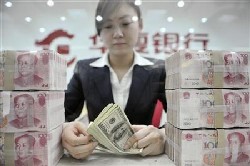Top US lawmakers have slammed China for restrictive market access and "blatant stealing" of intellectual property rights of American businesses and appealed to the Obama Administration for implementing necessary steps to protect the interest of its businesses. "While China presents the potential of 1.4 billion customers for our exports, it purposely impedes market access for US goods and services and blatantly steals the intellectual property of American businesses," said Congressman Dave Camp, Chairman of the House Ways and Means Committee at a Congressional hearing convened by him.
"While China presents the potential of 1.4 billion customers for our exports, it purposely impedes market access for US goods and services and blatantly steals the intellectual property of American businesses," said Congressman Dave Camp, Chairman of the House Ways and Means Committee at a Congressional hearing convened by him.
"The litany of China's trade-distorting policies is deeply troubling and cannot be allowed to stand. Part of our strategy for addressing these issues should include resumption of our bilateral investment treaty negotiations," Camp said.
He strongly supported the administration's efforts to promptly conclude an ambitious Doha Round of negotiations at the World Trade Organisation, and hoped that renewed efforts over the past few months will lead to success.
Alleging that China was distorting trade policies, Congressman Sander Levin urged the Obama Administration to take a more assertive stance to address China's currency manipulation.
Ambassador Ron Kirk, US Trade Representative, said that engagement with China - including through the Joint Commission on Commerce and Trade - has been very productive, showing real results in addressing "indigenous innovation" policies, improving intellectual property right protections, including securing greater use of legal software, securing technology neutrality in the telecommunication and smart grid sectors.
"Importantly, China agreed to delink its innovation policy from the provision of government procurement preferences and to cover sub-central entities in its next offer to join the Government Procurement Agreement," Kirk said.
"How are we going to work and move forward on intellectual property protection in China? How are we going to keep the focus on this issue in China?" said Congressman Jim McDermott.
It practically didn't come up when (the Chinese) President Hu (Jintao) was here, and it doesn't appear that the Chinese are stepping up to address the massive piracy which is underway in their enterprises, including the state-owned enterprises which put US companies at a competitive disadvantage, he said.
"It seems to me that the Chinese are very clever in how they have moved around, but the Chinese Audit Authority has the ability to track how much money in the China procurement system is being spent. That's helpful, but it doesn't end the piracy. They don't check as to whether the software used in their government is legal or not," McDermott said.
Noting that the issue of piracy and copywriting of America's intellectual goods and work product was one of the key concerns at USTR, Kirk said it was a key component of their enforcement efforts, and a key part of the dialogue with China.
"This issue did come up in President Hu's visit with President Obama. He addressed it directly.
"As you know, we recently concluded the Joint Commission on Commerce and Trade, which Secretary Locke and I take the lead. In December we did get a commitment from the government of China to begin to address more rigorously the absence of using legitimate software in their government procurement. During President Hu's visit we got two additional important commitments," he said.
The Chinese have said they would do this a number of times, but they didn't give their governments and sub-governments any resources to purchase legitimate software, Kirk added.








 © 2025
© 2025